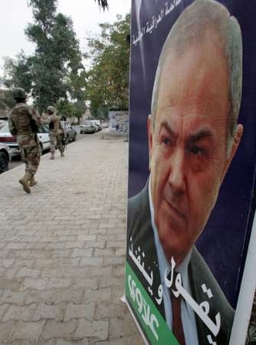|
Iraq election results show Sunni gains
(AP)
Updated: 2006-01-20 21:31
The election commission said Friday that an alliance of
Shiite religious parties won the biggest number of seats in Iraq's new
parliament but too few to rule without coalition partners. Sunni Arabs gained
seats over the previous balloting.

Iraqi soldiers patrol a road near an election
campaign poster of former Iraqi prime minister Iyad Allawi in Baghdad
January 20, 2006. Final results of Iraq's Dec. 15 election gave the
Shi'ite Islamist Alliance 128 seats, 10 short of a majority in the
275-seat chamber, an Electoral Commission official told a news conference
on Friday. The results, in line with expectations and earlier counts, gave
the Kurdish bloc 53 seats and former prime minister Iyad Allawi's secular
list 25, with two main Sunni Arab groups, the Accordance Front and the
National Dialogue Front, securing 44 and 11 places respectively, Safwat
Rasheed said. [Reuters] |
Commission official Safwat Rasheed said the Shiite United Iraqi Alliance
captured 128 of the 275 seats in the Dec. 15 election, down from the 146 it won
in January 2005 balloting. It needed 138 to rule without partners.
A Sunni ticket, the Iraqi Accordance Front, won 44 seats. Another Sunni
coalition headed by Saleh al-Mutlaq finished with 11 seats, Rasheed said. A few
other Sunnis won seats on other tickets.
That will give the Sunni Arabs a bigger voice in the legislature than they
had in the outgoing assembly, which included only 17 from the community forming
the backbone of the insurgency. Many Sunnis had boycotted the January vote.
Kurds saw their seat total reduced. An alliance of the two major Kurdish
parties won 53 seats, down from the 75 they took in the January 2005 vote.
A rival Kurdish ticket, the Kurdish Islamic Group, won five seats, a gain of
three from the outgoing parliament.
A ticket headed by secular Shiite former Prime Minister Ayad Allawi won 25
seats, down from 40 in the outgoing assembly. Allawi, who was supported by the
United States, earned a reputation for toughness in dealing with insurgents, but
his term was marred by allegations of corruption.
Politicians have four days to contest the results, which were largely in line
with preliminary returns following the balloting. Officials then will have 10
days to study any complaints before they certify the results and parliament
convenes to appoint a new government.
U.S. officials hope that a greater Sunni voice in the new parliament and
government will help defuse the insurgency so American and other international
troops can begin withdrawing.
The results were announced a day after an international review group said the
Dec. 15 election was flawed but generally fair considering the country's
security crisis. Sunni politicians had demanded the review after raising
allegations of fraud. Al-Mutlaq had called for a new election.
The decision to have the election reviewed by outside experts was an attempt
to mollify Sunni complaints and encourage them to join the political process.
Sunni Arabs dominated political life in Iraq for generations but are believed
to comprise about 20 percent of the country's estimated 27 million people.
Shiites form about 60 percent and Kurds 15-20 percent.
Many Sunnis contest those figures and assumed they would win more seats since
the voting in Iraq's three ballots after the 2003 fall of Saddam Hussein has
been along sectarian lines.
|